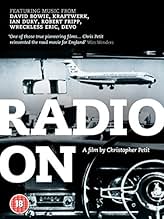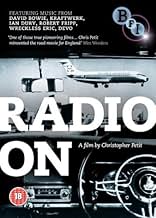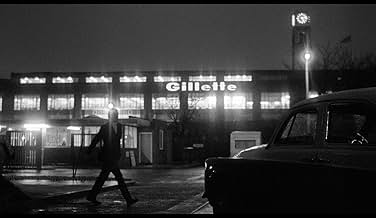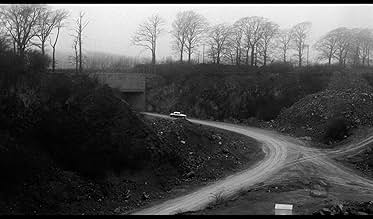Radio On
- 1979
- 1 Std. 44 Min.
IMDb-BEWERTUNG
6,5/10
1282
IHRE BEWERTUNG
Füge eine Handlung in deiner Sprache hinzuIn 1970s Britain, a man drives from London to Bristol to investigate his brother's death, and the purpose of his trip is offset by his encounters with a series of odd people.In 1970s Britain, a man drives from London to Bristol to investigate his brother's death, and the purpose of his trip is offset by his encounters with a series of odd people.In 1970s Britain, a man drives from London to Bristol to investigate his brother's death, and the purpose of his trip is offset by his encounters with a series of odd people.
- Auszeichnungen
- 1 Gewinn & 1 Nominierung insgesamt
Empfohlene Bewertungen
I had the pleasure of attending a screening of 'Radio On 'presented by its director Chris Petit.
Often described as "austere", and rightly so, the influence of Wim Wenders is immediately clear, but unlike Wenders' which films try to hide a sense of self importance behind lengthy banality it is this film's very understatedness that is the key to its (limited) success.
Halliwell's described this as a film "barely able to summon up any interest in its characters" although it is the very detached and unemotional stance of Petit towards his lead that makes this such an unbearably real portrayal of disenchantment, we begin to feel disenfranchised with humanity itself.
Pointless Trivia: At the premiere screening of this film no one recognised the lead actor amongst the crowd as he has a shock of orange hair undetectable in a black and white movie).
Often described as "austere", and rightly so, the influence of Wim Wenders is immediately clear, but unlike Wenders' which films try to hide a sense of self importance behind lengthy banality it is this film's very understatedness that is the key to its (limited) success.
Halliwell's described this as a film "barely able to summon up any interest in its characters" although it is the very detached and unemotional stance of Petit towards his lead that makes this such an unbearably real portrayal of disenchantment, we begin to feel disenfranchised with humanity itself.
Pointless Trivia: At the premiere screening of this film no one recognised the lead actor amongst the crowd as he has a shock of orange hair undetectable in a black and white movie).
This is one of Britain's forgotten films (only 4 IMDb reviews at the time of writing these comments, nearly 30 years after it was made). The first film by the then film critic Chris Petit, made in 1979, it conveys accurately the bleakness - and the depressing music - of the late 1970s.
The plot is minimal. A morose, alienated man learns of his brother's death and travels from London to Bristol to find out more. The 'quest' is half-hearted and his encounters on the road and in Bristol are unsatisfactory and unfulfilled. Nothing seems worthwhile following through. whether it is his investigation into his brother's life and death, his encounter with a German woman or even his relationship with his antique Rover car.
The B/W photography is splendid, matching perfectly the mood of alienation and the bleak picture of a part of England in the winter of 1979. The influence of Wim Wenders (the producer) is clear but it is very distinctively an English film, worth seeing and listening to if only to remind us of the dismal '70s - but having seen it, that's enough. Interesting, but not a classic.
The plot is minimal. A morose, alienated man learns of his brother's death and travels from London to Bristol to find out more. The 'quest' is half-hearted and his encounters on the road and in Bristol are unsatisfactory and unfulfilled. Nothing seems worthwhile following through. whether it is his investigation into his brother's life and death, his encounter with a German woman or even his relationship with his antique Rover car.
The B/W photography is splendid, matching perfectly the mood of alienation and the bleak picture of a part of England in the winter of 1979. The influence of Wim Wenders (the producer) is clear but it is very distinctively an English film, worth seeing and listening to if only to remind us of the dismal '70s - but having seen it, that's enough. Interesting, but not a classic.
Former Time Out critic, Christopher Petit's directorial debut, Radio On, shows its European credentials well. I say this for a couple of reasons. For one, like the French New Wave participants, Petit began as a film critic, and the sparing nature of this existential road movie, was self- consciously attempting to move British cinema towards a European style. Secondly, and far more telling, is the influence and participation of the New German Cinema of the 1970's. Whilst interviewing Wim Wenders, the subject of Petit's own screenplay arose, and Wenders was impressed. Therefore, Wenders became associate producer, and also lent the use of his cinematographer, Martin Schafer.
Beautifully shot in monochrome, the black and white imagery displays its artful intentions. We follow Robert (David Beames) as he drives from London to Bristol, after being informed that his brother has committed suicide. On his journey, he encounters several unhinged British citizens, including a Glaswegian squaddie with anger management issues, as well as meeting Sting at a petrol station, who seems to be obsessed with Eddie Cochran. Not much really happens in the film, but the most significant (at least the longest) "relationship" is with a German woman, Ingrid (Lisa Kreuzer - who was in Wenders' Alice in the Cities (1974 - Review #96)), who is searching for her missing daughter named Alice (a possible reference to the aforementioned German film.
This is a bleak representation of 1970's Britain. Not a hard task in itself (you could have pointed a camera anywhere in '70's Britain, and it would have been depressing). But what was fundamental to Petit's intentions, was actually a comment on the decline of British cinema. The main output of British cinema was within the prurient genre of the repressed "sex comedies" such as the on-going Carry On.. films, or the equally lamentable Confessions... series with Robin Askwith. When there was any serious attempt at British cinema, they were barely seen. Petit, felt that the Americanisation of our cinema's and the fact that our national cinema was laughable, was decreasing our cultural identity. Radio On is an attempt to move our cinema towards a more European, existential path, and with a more political consciousness.
www.the-wrath-of-blog.blogspot.com
Beautifully shot in monochrome, the black and white imagery displays its artful intentions. We follow Robert (David Beames) as he drives from London to Bristol, after being informed that his brother has committed suicide. On his journey, he encounters several unhinged British citizens, including a Glaswegian squaddie with anger management issues, as well as meeting Sting at a petrol station, who seems to be obsessed with Eddie Cochran. Not much really happens in the film, but the most significant (at least the longest) "relationship" is with a German woman, Ingrid (Lisa Kreuzer - who was in Wenders' Alice in the Cities (1974 - Review #96)), who is searching for her missing daughter named Alice (a possible reference to the aforementioned German film.
This is a bleak representation of 1970's Britain. Not a hard task in itself (you could have pointed a camera anywhere in '70's Britain, and it would have been depressing). But what was fundamental to Petit's intentions, was actually a comment on the decline of British cinema. The main output of British cinema was within the prurient genre of the repressed "sex comedies" such as the on-going Carry On.. films, or the equally lamentable Confessions... series with Robin Askwith. When there was any serious attempt at British cinema, they were barely seen. Petit, felt that the Americanisation of our cinema's and the fact that our national cinema was laughable, was decreasing our cultural identity. Radio On is an attempt to move our cinema towards a more European, existential path, and with a more political consciousness.
www.the-wrath-of-blog.blogspot.com
As enigmatic as its title, Chris Petit's debut film is interesting visually, but less so in other respects, particularly narrative drive and character depth. To be perfectly honest, it starts slowly and decelerates from there, with David Beames' disillusioned disc-jockey setting out to ostensibly look into the death (in his own bath) of his brother. Along the way he encounters obsessive individuals like an unhinged Scottish army deserter, an Eddie Cochran-obsessed garage attendant and a young German woman trying to track down her daughter.
More than likely the film is working at allegorical and symbolic levels I couldn't comprehend, although I did recognise the bleakness of the environment depicted here, having lived through the period as a young adult in Glasgow. I wasn't surprised to see Wim Wenders' name on the production credits, so terribly slow is the I hesitate to call it action, the longueurs broken most frequently by music from the contemporary post-industrial music scene, including tracks by Kraftwerk, Bowie and Fripp amongst others. In fact the music is so dominant at times, you might think the film is the visual accompaniment to its own soundtrack, rather than the other way round.
It's all very stilted and boring however. Some humour might have helped a bit or even some sort of dramatic climax, but I gave up on that hope quite early. As a snapshot of this country suffering economic hardship in a bleak post-industrial wasteland (no change there, then), I just about got Beames aimless and listless drifting as a metaphor for the frustrated youth of the time, distrusting authority, travelling without moving as the saying goes.
Eventually he literally moves to the edge as he ends up on the edge of a precipice, in actuality a disused quarry but by then I had tired of the film's general inaction, dull characterisations, flat dialogue and obscure locations. The camera lingers on and on long after a scene has ended, and what I presume are supposed to be meaningful silences are in the end just awkward pauses.
The Britain of the early Thatcher government was like this visually, grey, cold bleak and pretty hopeless. I'm not quite sure however what I was meant to derive from the main character's "journey", even if in truth he seemed to be on a road to nowhere. I could see cultural cross-references to the music of the day (The Specials "Ghost Town" from a year later would have fitted the soundtrack very well) and also the photography of Anton Corbijn (best known for his work with U2 and Depeche Mode), but as a bona-fide movie though, I didn't get its vaguely film-noir meets urban decay aspiration and might have wished I'd put on a few Bowie and Kraftwerk albums to pass the time instead.
More than likely the film is working at allegorical and symbolic levels I couldn't comprehend, although I did recognise the bleakness of the environment depicted here, having lived through the period as a young adult in Glasgow. I wasn't surprised to see Wim Wenders' name on the production credits, so terribly slow is the I hesitate to call it action, the longueurs broken most frequently by music from the contemporary post-industrial music scene, including tracks by Kraftwerk, Bowie and Fripp amongst others. In fact the music is so dominant at times, you might think the film is the visual accompaniment to its own soundtrack, rather than the other way round.
It's all very stilted and boring however. Some humour might have helped a bit or even some sort of dramatic climax, but I gave up on that hope quite early. As a snapshot of this country suffering economic hardship in a bleak post-industrial wasteland (no change there, then), I just about got Beames aimless and listless drifting as a metaphor for the frustrated youth of the time, distrusting authority, travelling without moving as the saying goes.
Eventually he literally moves to the edge as he ends up on the edge of a precipice, in actuality a disused quarry but by then I had tired of the film's general inaction, dull characterisations, flat dialogue and obscure locations. The camera lingers on and on long after a scene has ended, and what I presume are supposed to be meaningful silences are in the end just awkward pauses.
The Britain of the early Thatcher government was like this visually, grey, cold bleak and pretty hopeless. I'm not quite sure however what I was meant to derive from the main character's "journey", even if in truth he seemed to be on a road to nowhere. I could see cultural cross-references to the music of the day (The Specials "Ghost Town" from a year later would have fitted the soundtrack very well) and also the photography of Anton Corbijn (best known for his work with U2 and Depeche Mode), but as a bona-fide movie though, I didn't get its vaguely film-noir meets urban decay aspiration and might have wished I'd put on a few Bowie and Kraftwerk albums to pass the time instead.
Filmed in black and white with some great imagery; I love how this film looks with its art-house styling. There is a pretty good soundtrack with songs from the likes of David Bowie, Ian Dury, Kraftwerk and Devo
amongst others. All the performances were good but all delivered in a very 'matter of fact' manner. David Beames took centre stage as Robert with Lisa Kreuzer playing Ingrid. Sandy Ratcliff was Kathy and Andrew Byatt the Deserter but (for me) the star turn was a brief cameo from Sting as the Eddie Cochrane loving petrol pump attendant.
I must admit I was somewhat disappointed by this film. I expected a little more focus on the music for one thing and the fact that everyone in Bristol seemed to speak with a London accent didn't help! It has a very slow pace which I was prepared to accept as long as something happened. Sadly, apart from one bright sequence featuring Sting, not a lot seemed to. There are also sequences where the majority of the dialogue is in German, with no subtitles; very odd! I will give the filmmakers credit for some excellent imagery showing just how bleak an English winter can be (even in the South). Over all I'd say one for lovers of art-house films for them, Recommended for the general cinebuff maybe not.
My Score 6.4/10
IMDb Score: 6.3/10 (based on 296 votes at the time of going to press).
MetaScore: NO DATA: (Based on 0 critic reviews provided by Metacritic.com at the time of going to press).
Rotten Tomatoes 'Tomatometer' Score: NO DATA (based on 0 reviews counted at the time of going to press).
Rotten Tomatoes 'Audience' Score: 12/100 'Want to See' (based on 625 user ratings counted at the time of going to press).
You can find an expanded version of this review on my blog: Thoughts of a SteelMonster.
I must admit I was somewhat disappointed by this film. I expected a little more focus on the music for one thing and the fact that everyone in Bristol seemed to speak with a London accent didn't help! It has a very slow pace which I was prepared to accept as long as something happened. Sadly, apart from one bright sequence featuring Sting, not a lot seemed to. There are also sequences where the majority of the dialogue is in German, with no subtitles; very odd! I will give the filmmakers credit for some excellent imagery showing just how bleak an English winter can be (even in the South). Over all I'd say one for lovers of art-house films for them, Recommended for the general cinebuff maybe not.
My Score 6.4/10
IMDb Score: 6.3/10 (based on 296 votes at the time of going to press).
MetaScore: NO DATA: (Based on 0 critic reviews provided by Metacritic.com at the time of going to press).
Rotten Tomatoes 'Tomatometer' Score: NO DATA (based on 0 reviews counted at the time of going to press).
Rotten Tomatoes 'Audience' Score: 12/100 'Want to See' (based on 625 user ratings counted at the time of going to press).
You can find an expanded version of this review on my blog: Thoughts of a SteelMonster.
Wusstest du schon
- WissenswertesIn Britain, this film had a limited release on the art-house circuit in 1980 in a double-bill with a famous film made half-a-century earlier, Luis Bunuel's "L'Age D'Or", which had only recently come off the censor's banned list. One critic remarked that this double-billing meant that he had had both his best and his worst cinema-going experience of 1980 on the same evening.
- VerbindungenFeatured in Radio On Remix (1998)
Top-Auswahl
Melde dich zum Bewerten an und greife auf die Watchlist für personalisierte Empfehlungen zu.
- How long is Radio On?Powered by Alexa
Details
- Erscheinungsdatum
- Herkunftsländer
- Sprachen
- Auch bekannt als
- Radio on
- Drehorte
- M4, London, England, Vereinigtes Königreich(6 High-rise Flats on Green Dragon Lane)
- Produktionsfirmen
- Weitere beteiligte Unternehmen bei IMDbPro anzeigen
- Laufzeit1 Stunde 44 Minuten
- Farbe
- Sound-Mix
- Seitenverhältnis
- 1.85 : 1
Zu dieser Seite beitragen
Bearbeitung vorschlagen oder fehlenden Inhalt hinzufügen

























